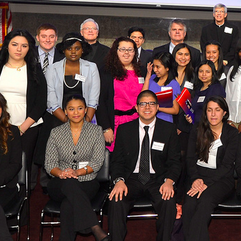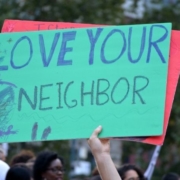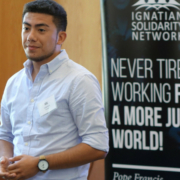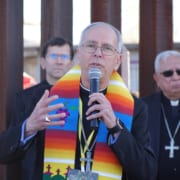Jesuit University Leaders Support Humane Immigration Reform
BY CHRIS KERR | December 13, 2013
“Imagine growing up with your classmates from elementary school through high school with the dream of one day going to college, only to discover that you are in fact an undocumented immigrant,” began Dr. Eugene Cornacchia, President of Saint Peter’s University, in a recent Huffington Post op-ed in support of New Jersey’s DREAM Act legislation.
Cornacchia closed the op-ed with the following statement:
As the president of a private university, I strongly support opening the door to federal and state financial aid programs for the DREAMers. Although many of these students would be likely to enroll in public institutions due to financial constraints, I would like to see as many DREAMers as possible on the Saint Peter’s campus. It is essential to provide them with the opportunity for a college education. It is the right thing to do. It is the just thing to do. It is the Christian thing to do.

Jesuit university presidents and students join Congressional staffers at a briefing on the Immigration: Undocumented Students in Higher Education research project in February [SOURCE: Fairfield University]
In late spring of this year Loyola University Chicago publicly announced that the university’s Stritch School of Medicine would waive legal residency as an admission requirement and offer financing plans through a state agency. They become one of the first medical schools in the nation to publicly state their acceptance of undocumented medical students. When asked why Loyola took this bold step by Chicago Crain’s Business in June, Dr. Linda Brubaker, dean of the Stricth School noted the decision’s strong connection to the university’s Jesuit mission, stating, “If a Jesuit Catholic school doesn’t do something like this, who would?”
Jesuit university presidents have also collectively made calls for comprehensive immigration reform numerous times over the past year. This past July, a majority of the 28 Jesuit university presidents joined a group of 100+ Catholic university presidents calling for immigration reform in a sign-on letter sponsored by the Association of Catholic Colleges and Universities. Jesuit university presidents also offered their support to a group of researchers from Fairfield Univesrity, Loyola University Chicago and Santa Clara University, affirming a recent study which analyzed ways that Jesuit institutions can further support undocumented students. In addition, Jesuit institutions joined the U.S. Jesuit Provincials in calling on Congress and President Obama to enact humane reforms.
Jesuit universities have been supported in calling for immigration reform by the Association of Jesuit Colleges and Universities, U.S. Jesuit Conference Social & International Ministries Office and province staff and the Ignatian Solidarity Network.
Chris joined the Ignatian Solidarity Network (ISN) as executive director in 2011. He has over fifteen years of experience in social justice advocacy and leadership in Catholic education and ministry. Prior to ISN he served in multiple roles at John Carroll University, including coordinating international immersion experience and social justice education programming as an inaugural co-director of John Carroll’s Arrupe Scholars Program for Social Action. Prior to his time at John Carroll he served as a teacher and administrator at the elementary and secondary levels in Catholic Diocese of Cleveland. Chris speaks regularly at campuses and parishes about social justice education and advocacy, Jesuit mission, and a broad range of social justice issues. He currently serves on the board of directors for Christians for Peace in El Salvador (CRISPAZ). Chris earned a B.A. and M.A. from John Carroll University in University Heights, Ohio. He and his family reside in Shaker Heights, Ohio.






 2019
2019 



“Imagine growing up with your classmates from elementary school through high school with the dream of one day going to college, only to discover that your spot has been taken by an illegal immigrant” or “you have to incur $100K in debt while illegal immigrant students get grants and tax payer dollars that are unavailable to you…..” There is another side to the Jesuit coin in this matter. These kids have parents who came to this country illegally. This is unfortunate and should not be our problem. This is Mexico’s problem and the Mexican government is morally bound to fix it. It seems to me the Jesuits should be focussing their efforts on Mexico. What is the Jesuit’s stance on crime? My child shouldn’t have to suffer because these kids parents have broken our laws. My taxes shouldn’t go up because these kids parents have broken our laws. Amnesty is not the answer. It wasn’t in the 1980’s.
Thanks for your comment Robert. We choose to use the term undocumented person as the act of crossing the border or remaining in the U.S. without proper documentation is illegal but the person of course is not.
It’s also important to note that not all undocumented persons in the U.S. are from Mexico as your comment suggests. Nor are all people here because they crossed the US-Mexico border without documentation. There are some good stats about this at: http://pri.org/stories/2013-05-10/11-million-and-growing-breaking-down-number-undocumented-immigrants-us
If one assumes that anything that another person gets takes something away from themselves Robert, then everyones’ children are a threat to the livelihood of your own – both documented and undocumented. Our Catholic faith calls us to find ways to welcome strangers and seek ways to provide those who are marginalized by poverty and injustice greater opportunity to be more fully human. The current reality for a person who is poor and wants to come to the U.S. is very limited – pathways to citizenship “the right way” can take 10 to 15 years, if they are even possible (which for many there are not). Current legislation in Congress would provide 4 to 8 million of the 11 million undocumented persons in the U.S. with a 13-year pathway to citizenship with many requirements (including paying into things like social security and Medicare while working but not accumulating credit toward those benefits – much like many undocumented persons do right now). I don’t think it is fair to call a proposal like this amnesty – as it would be a significant commitment of time and resources to ever become a U.S. citizen.
Back to the young people, advocacy for legislation like DREAM Act simply allows young people brought to this country the same opportunities that their high school peers have when they graduate. It allows young, intelligent, future leaders the chance to flourish in our country, serve our communities and fuel our economy.